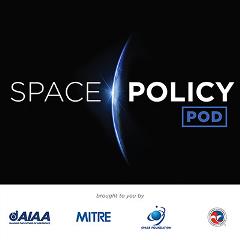Space Policy Pod: Episode 12 (Alexander Macdonald, NASA) 14 October 2020
-
Space Policy Pod

Given the current real-world challenges confronting all of us, AIAA has joined the MITRE Corporation, Space Foundation, and the U.S. Chamber of Commerce to produce this podcast series to examine events and ideas affecting the space sector. We hope the episodes serve as an enlightening discussion on the relevant topics of the day with insights from key policymakers in the field.
All Episodes | Subscribe! Spotify | Apple Podcasts -
 Space Policy Pod: Episode 12 (Alexander Macdonald, NASA)
Space Policy Pod: Episode 12 (Alexander Macdonald, NASA)
1 January 1970
Chief Economist, Office of the Administrator, and Program Executive, International Space Station National Lab, NASA
Episode recorded 1 October 2020
This podcast discussion features Alex Macdonald, NASA’s chief economist. He also serves as program executive of the International Space Station National Lab. He was previously the Senior Economic Advisor in the Office of the Administrator and was the founding program executive of NASA’s Emerging Space Office. Dr. Macdonald is a former executive staff specialist on commercial space at NASA’s Jet Propulsion Laboratory, a former research faculty member at Carnegie Mellon University, and has worked on small satellite mission design at NASA’s Ames Research Center.
Dr. Macdonald received his undergraduate degree in economics from Queen’s University in Canada, his master’s degree in economics from the University of British Columbia, and his doctorate from the University of Oxford.
Key Takeaways
The International Space Station as the Center of our Human Spaceflight economy
As an economist, Dr. Macdonald sees the ISS as a central economic node for development of commercial human spaceflight. Without ISS, we would not have a demand driver to develop commercial cargo capabilities and the demand driver to develop commercial crew capabilities such as the recently launched NASA SpaceX’s Demo-2 mission.
Using the ISS as a platform for Science Research & Development
The ISS National Lab has enabled a quiet revolution for a decade, since the 2010 NASA Authorization Act. Dr. Macdonald outlines the work of the National Lab and how its projects can come from many agencies, academia, schools and companies pursuing their own research by using microgravity to create new products.
Dr. Macdonald discusses the Independent Review findings recently published on the ISS National Lab. He highlights the core findings that showed the National Lab is not self-sufficient in generating independent revenue but rather as a multi-user facility of a National Lab of the ISS itself.
Extending the ISS beyond 2024
Dr. Macdonald shares some insights on the recent NASA Authorization bill language that includes extension dates and outlines arguments for continuous human presence in Low Earth Orbit such as using the ISS to test deep space ecosystems and its commercial value. He discussed recommendations from a co-developed report for the National Space Council by NASA, Department of State and Department of Commerce which laid out a strategy for human presence in Low Earth orbit.
Commercialization of Low Earth Orbit and the role of the National Lab
Dr. Macdonald discusses the role of the National Lab in the transition of the ISS to commercial operations and the value in considering a Low Earth Orbit National Lab. He outlines two reasons that we have yet to see the transition of the ISS operations itself to commercial operations. These reasons include the complex enterprise operating the Station (comprising of the Johnson Space Center, Boeing, and other countries), costs involved in conducting the transition, as well as whether new revenue streams would generate enough revenue to operate the space station.
Exciting areas for the ISS
Dr. Macdonald discusses exciting possibilities in LEO commercializing involving astronaut missions using commercial crew capabilities, Axiom’s proposal for a private habitat module, and a solicitation NASA will release for a free flyer. Dr.Macdonald also highlights in-space production as an area of focus going forward for the National Lab and ways NASA is stimulating such growth.
The role of International Partners in ISS Commercialization
Russia and Japan have used their resources for commercial research and operations aboard the International Space Station. The real question is how the partnership structure will transition to a commercial platform. Dr. Macdonald discusses options of payment, and how the U.S. as a whole of government will tackle this challenge.
